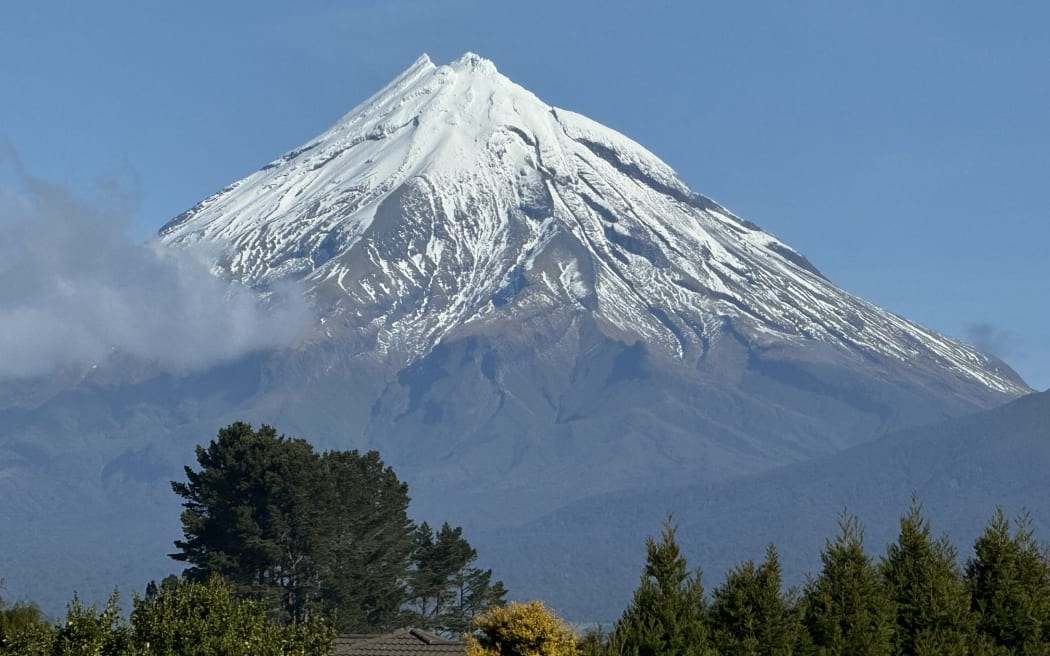
Mount Taranaki Photo: Christina Persico/RNZ
Taranaki has adopted an "adapt or perish" catchcry as part of a regional development strategy, but seabed mining is conspicuous in its absence.
The Tapuae Roa 2025/2026 Action Plan instead prioritises what it describes as "pragmatic projects and initiatives that would help Taranaki leverage its strengths".
Taranaki Mayoral Forum chair Neil Volzke said the rapidly changing global economic environment was forcing the province to look beyond energy and food production.
"Particularly with the impact and the decline of the oil and gas industry, so effectively what we are saying is that our region needs to diversify.
"We need to find suitable replacements that can generate good jobs growth and create wealth, so that we do have a future and so that we don't just [sit] on our hands and watch the world go by and suddenly discover we've been left behind."
"Adapt or perish" was the strong message the region's mayors wanted to convey, Volzke said.
The action plan proposes a series of initiatives aimed at fostering investment and supporting emerging industries, but seabed mining did not make the short list.
Taranaki applied innovation centre: establishing a hub for biotechnology and high-tech industries.
Māori economic development strategy: to align Māori economic growth with regional opportunities.
Economic innovation zone: a designated area to stimulate economic growth, attract investment, and foster collaboration between businesses, research institutions, and governments.
Taranaki Maunga Tourism Opportunities: developing sustainable visitor experiences centred around Taranaki Maunga, including new trails and upgraded visitor activities.
Driving renewables and innovation: including offshore wind opportunities, and supporting projects that convert renewable energy into sustainable fuels like green hydrogen and methanol.
Strengthening engineering: strategies to retain and develop the region's skilled workforce.
Land diversification: expanding initiatives like Branching Out to explore new crops and value chains.
Volzke said the world was grappling with the need to reduce emissions while maintaining economic security, and Taranaki must position itself to grow sustainably in the face of these challenges.
"There's a number of areas certainly in the area of food production - that is one - and tourism is another - but there's a number of threads throughout the report that suggest there are lots of things that can be done to enhance our economic well being."

Taranaki Mayoral Forum chair Neil Volzke Photo: RNZ / Robin Martin
He was optimistic the region's children and grandchildren would inherit a province full of opportunity.
"Well, in the energy sector there's already some good work being done there particularly in terms of wind farms and obviously solar farms and promoting the province as the energy centre for New Zealand and there's a lot of work being done in that area.
"And through Venture Taranaki there was a lot of work being done exploring different crops and what other things could be developed as value-added products developed here in the region."
At a Taranaki Regional Growth Summit last week, Regional Development Minister Shane Jones said reviving the oil and gas sector and accelerating the development of seabed mining were the single largest opportunities for economic growth in the region.
Volzke said the Action Plan was developed through consensus, and that seabed mining had few supporters.
"Offshore wind is seen as a sustainable green energy source, and it was something everybody bought into, and clearly seabed mining doesn't find favour with everybody. In a nutshell it didn't make the cut."
Volzke said the Taranaki Mayoral Forum had raised with the government that the offshore wind and seabed mining sectors were potentially not compatible, and had asked for that to be explored thoroughly.
"Our concern was that a decision may be made without everyone being aware of those particular views, so we did raise that with ministers Shane Jones and Simeon Brown, and we did that in writing.
"We wanted to make sure that any decision they made in the future was robust and not pitting one sector against the other without knowing all the information."
Te Puna Umanga Venture Taranaki, the regional development agency, facilitated the creation of the Taupae Roa 2024/2025 Action Plan, which was created in collaboration between Taranaki mayors, iwi, and sector leaders.
Venture Taranaki chief executive Kelvin Wright said it was a plan for everyone in Taranaki, designed to encourage unity and adaptation in the face of change.
"As a region we're known for our strong Team Taranaki collaborative approach, which has enabled Taranaki to be a leader and future-focussed region that doesn't shy away from challenges, but rather looks at how we can turn them into opportunities."
About 200 guests attended the launch, which featured talks from regional leaders and iwi representatives highlighting the importance of continued partnership to achieve shared goals.
The Action Plan builds on the long-term regional strategies of Tapuae Roa - Make Way for Taranaki, originally launched in 2017, and Taranaki 2050.





